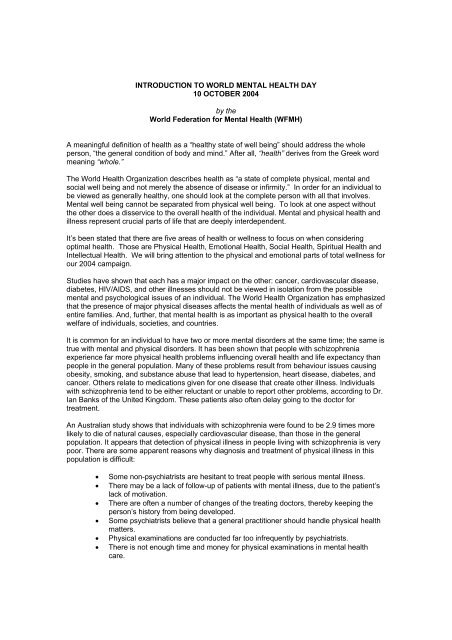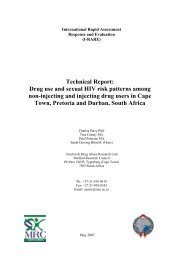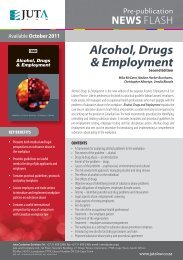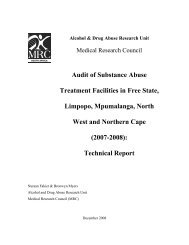INTRODUCTION TO WORLD MENTAL HEALTH DAY 10 OCTOBER ...
INTRODUCTION TO WORLD MENTAL HEALTH DAY 10 OCTOBER ...
INTRODUCTION TO WORLD MENTAL HEALTH DAY 10 OCTOBER ...
Create successful ePaper yourself
Turn your PDF publications into a flip-book with our unique Google optimized e-Paper software.
<strong>INTRODUCTION</strong> <strong>TO</strong> <strong>WORLD</strong> <strong>MENTAL</strong> <strong>HEALTH</strong> <strong>DAY</strong><br />
<strong>10</strong> OC<strong>TO</strong>BER 2004<br />
by the<br />
World Federation for Mental Health (WFMH)<br />
A meaningful definition of health as a “healthy state of well being” should address the whole<br />
person, “the general condition of body and mind.” After all, “health” derives from the Greek word<br />
meaning “whole.”<br />
The World Health Organization describes health as “a state of complete physical, mental and<br />
social well being and not merely the absence of disease or infirmity.” In order for an individual to<br />
be viewed as generally healthy, one should look at the complete person with all that involves.<br />
Mental well being cannot be separated from physical well being. To look at one aspect without<br />
the other does a disservice to the overall health of the individual. Mental and physical health and<br />
illness represent crucial parts of life that are deeply interdependent.<br />
It’s been stated that there are five areas of health or wellness to focus on when considering<br />
optimal health. Those are Physical Health, Emotional Health, Social Health, Spiritual Health and<br />
Intellectual Health. We will bring attention to the physical and emotional parts of total wellness for<br />
our 2004 campaign.<br />
Studies have shown that each has a major impact on the other: cancer, cardiovascular disease,<br />
diabetes, HIV/AIDS, and other illnesses should not be viewed in isolation from the possible<br />
mental and psychological issues of an individual. The World Health Organization has emphasized<br />
that the presence of major physical diseases affects the mental health of individuals as well as of<br />
entire families. And, further, that mental health is as important as physical health to the overall<br />
welfare of individuals, societies, and countries.<br />
It is common for an individual to have two or more mental disorders at the same time; the same is<br />
true with mental and physical disorders. It has been shown that people with schizophrenia<br />
experience far more physical health problems influencing overall health and life expectancy than<br />
people in the general population. Many of these problems result from behaviour issues causing<br />
obesity, smoking, and substance abuse that lead to hypertension, heart disease, diabetes, and<br />
cancer. Others relate to medications given for one disease that create other illness. Individuals<br />
with schizophrenia tend to be either reluctant or unable to report other problems, according to Dr.<br />
Ian Banks of the United Kingdom. These patients also often delay going to the doctor for<br />
treatment.<br />
An Australian study shows that individuals with schizophrenia were found to be 2.9 times more<br />
likely to die of natural causes, especially cardiovascular disease, than those in the general<br />
population. It appears that detection of physical illness in people living with schizophrenia is very<br />
poor. There are some apparent reasons why diagnosis and treatment of physical illness in this<br />
population is difficult:<br />
<br />
<br />
<br />
<br />
<br />
<br />
Some non-psychiatrists are hesitant to treat people with serious mental illness.<br />
There may be a lack of follow-up of patients with mental illness, due to the patient’s<br />
lack of motivation.<br />
There are often a number of changes of the treating doctors, thereby keeping the<br />
person’s history from being developed.<br />
Some psychiatrists believe that a general practitioner should handle physical health<br />
matters.<br />
Physical examinations are conducted far too infrequently by psychiatrists.<br />
There is not enough time and money for physical examinations in mental health<br />
care.
Anxiety and depression often cause adverse changes in a person’s immune system thus making<br />
way for any number of physical illnesses. A person’s mental health has a profound effect on his<br />
or her behaviour as far as diet, exercise, sexual practices, smoking, etc. which may further the<br />
chances of adverse physical illnesses. Mentally ill individuals can have difficulty communicating<br />
their physical needs and problems. Many mentally ill people have a very high tolerance for pain<br />
and a reduction in pain sensitivity due to antipsychotic medications. People frequently seek help<br />
for physical ailments that may actually be symptoms of depression, such as allergic reactions,<br />
ulcers, or other disorders. It is clear that primary care physicians should look at potential mental<br />
health causes and consequences of physical illness in order to provide the best possible<br />
treatment. Too often this important link is overlooked.<br />
The Pan American Health Organization indicates that many discoveries in behavioural health are<br />
already successfully applied to clinical medical and public health problems and that technology<br />
dealing with behavioural change must be applied to health promotion in many more nations and<br />
communities and must be taught in every school for health professionals.<br />
A ground-breaking meeting at the U.S. National Institute for Mental Health (NIMH) entitled The<br />
Unwanted Cotraveler: Depression’s Toll on Other Illnesses was held in March 2001 and brought<br />
together government officials, researchers, academics, mental health professionals, mental<br />
health consumers, and members of the public. The former NIMH Director, Dr. Steven Hyman,<br />
stressed the fact that depression is a brain disease profoundly affecting the physical being,<br />
including the structure of the brain. Thus, the same chemistry that affects the brain also affects<br />
major physical illnesses such as diabetes, cardiovascular disease, and others. A number of<br />
participants in this meeting discussed about the role of stigma in these equations. As long as<br />
mental illness is seen as existing apart from physical illnesses, it will not receive the attention – or<br />
the funding – that it needs. A representative of the National Depressive and Manic-Depressive<br />
Association spoke of a survey completed by her organization showing that 78 percent of<br />
Americans with depression had not experienced complete control of their illness within the<br />
previous two months. She noted that if a chronic illness, such as diabetes, wasn’t completely<br />
controlled for the same percentage of diabetics, there would be a public outcry. She further stated<br />
that if people and their doctors can’t recognize the symptoms of depression or if people refuse to<br />
get treatment, depression would remain highly undiagnosed and untreated.<br />
The World Health Organization has been in the forefront of development of mental health<br />
services, especially in developing countries. This organization has reported that 4 of the <strong>10</strong><br />
leading causes of disability in the United States and other developed countries are mental<br />
disorders, including major depression, bipolar disorder, and schizophrenia. One of the first<br />
initiatives in developing countries was a project in Brazil, Colombia, Egypt, India, Philippines,<br />
Sudan, and Senegal to examine the feasibility of integrating mental health in general health care<br />
(1975-1981). The most recent effort is the publication of the World Health Report 2001 on Mental<br />
Health. The World Health Report 2001 has supported the movement to integrate mental health<br />
care into general health services in developing countries. A number of countries have used this<br />
approach to organize essential mental health services. In developing countries with limited<br />
resources this has meant a new beginning of care for people with mental disorders. India started<br />
training primary health care workers in 1975, forming the basis of the National Mental Health<br />
Programme formulated in 1982. Currently the government supports <strong>10</strong>0 district level programmes<br />
in 30 states. In Cambodia, the ministry of health trained a core group of personnel in community<br />
mental health, who in turn trained selected general medical staff at district hospitals. In the<br />
Islamic Republic of Iran, efforts to integrate mental health care started in the late 1980s and the<br />
programme has since been extended to the whole country, with services now covering almost the<br />
whole of the rural population (about 20 million people). Countries such as Afghanistan, Malaysia,<br />
Morocco, Nepal, Pakistan, Saudi Arabia, South Africa, the United Republic of Tanzania, and<br />
Zimbabwe have adopted similar approaches. Some studies have been carried out to evaluate the<br />
impact of integration, but more are urgently needed.
We live in an exciting time for innovations in treatment of illnesses. Many of the most feared<br />
illnesses of the body, such as cancer, heart disease, HIV and more are increasingly seen as<br />
treatable, survivable, even curable ailments. Yet, despite unprecedented knowledge gained in<br />
recent decades about the brain and human behaviour, mental health is not given the priority that<br />
it deserves and needs. In 1999, the U.S. Surgeon-General’s report on Mental Health recognized<br />
the extremely close relationship between our mental and physical health and well being. Then-<br />
Surgeon General David Satcher, M.D., Ph.D., stated that “Indeed, one of the foremost<br />
contributions of contemporary mental health research is the extent to which it has mended the<br />
destructive split between ‘mental’ and ‘physical’ health.”<br />
There have been many studies supporting the need to view physical and mental health together.<br />
A New York City Community Health Survey showed that significant emotional distress could<br />
affect physical health. A person who is very depressed or anxious may be more likely than others<br />
to engage in behaviour that may increase poor physical health and, in turn, physical illness may<br />
increase or even cause depression and anxiety. It’s a vicious cycle. The good news is that<br />
appropriate treatment for emotional problems can greatly improve the functioning of someone<br />
with physical illness. This study, along with many others, demonstrates that primary care<br />
providers can learn to recognize, treat, or make referrals for people with mental health problems.<br />
A joint position paper prepared by the Canadian Psychiatric Association and the College of<br />
Family Physicians of Canada stated, “In theory, the family physician and the psychiatrist are<br />
natural partners in the mental health care system. While neither may be able to meet every need<br />
of a client with a mental disorder, each can offer complementary services, which enables them to<br />
play a key role at different stages of an episode of illness and the subsequent period of recovery.<br />
Collaborative care between the family physicians and psychiatrists is a critical step toward<br />
improving the overall care received by people with mental disorders.” This paper highlights<br />
mental health problems in family medicine where it indicates that approximately a third of all<br />
family practice patients have identifiable mental health problems and that the statistics may be<br />
even higher for teenagers and the elderly. In addition, these organizations explored the difficult<br />
issues of access between mental health professionals and family practitioners, problems in<br />
communication, and a lack of personal contact. These researchers urge the promotion of an<br />
integrated and holistic approach to physical and mental health problems to ensure a greater<br />
continuity of care.<br />
The World Health Organization’s “Guide to Mental and Neurological Health in Primary Care”<br />
states that in a general-practice surgery, every third or fourth person seen has some form of<br />
mental disorder. This document indicates that the way in which services are provided emphasizes<br />
the importance of primary care as a setting for mental health care – showing the importance of<br />
people in primary care working more closely with those in mental health services. Good mental<br />
healthcare is a collaborative effort that includes primary care physicians, nurses, school<br />
counsellors, and mental health professionals.<br />
The U.S. Institute of Medicine (2001) has reported that one of the greatest advances in<br />
determinations of disease over the past two decades has been the identification of social and<br />
psychological conditions that influence mortality.<br />
Medical science is making huge advances on understanding chronic illnesses like dementia,<br />
diabetes, Parkinsonism, etc. But at the same time, the world is faced with dramatic increases in<br />
non-communicable diseases such as mental disorders, cardiovascular disease, cancer, etc. A full<br />
understanding of interactions between health and behaviour is important in the prevention and<br />
treatment of many diseases plaguing the world today.
Dr. Richard Nakamura of the U.S. National Institute of Mental Health urges primary care<br />
physicians to watch for individuals who experience many different illnesses because there may<br />
be signs of depression that mask or cause other illnesses. He has indicated that physical<br />
symptoms that mask depression can be allergic reactions, ulcers, or other disorders. He believes<br />
that viewing physical symptoms as unrelated to mental disorders, or vice versa, is missing the<br />
entire picture of the individual.<br />
The American Psychiatric Association (APA) has emphasized that there is growing evidence<br />
supporting the strong link between mental disorders and physical illnesses. The more serious the<br />
medical condition, the more likely the person will experience a mental health problem. The risk of<br />
depression is generally higher for people with serious medical illnesses such as heart disease,<br />
cancer, and diabetes. In addition, people with a mental illness may have more difficulty<br />
functioning on a day-to-day basis and may be unable to adhere to prescribed treatments that<br />
have been prescribed. People who are diagnosed and treated for co-existing illnesses often<br />
experience an overall improvement in their medical condition and their quality of life. The APA<br />
further states, “the link between mental disorders and physical illnesses must be addressed if<br />
both are to be treated successfully.” It is clear that mental health problems can have the same<br />
symptoms as physical problems; poor physical health can make mental health problems worse. It<br />
is extremely important, according to the Royal College of Psychiatrists, for a prompt assessment<br />
of physical health to be carried out in people being admitted to mental health units.<br />
Antipsychotic medications are very important to the medical management of many psychotic<br />
conditions, as shown in a 2003 Consensus Development Conference of the American Diabetes<br />
Association, the American Psychiatric Association, the American Association of Clinical<br />
Endocrinologists, and the North American Association for the Study of Obesity and published in<br />
the Journal of Clinical Psychiatry. The so-called “second generation antipsychotics (SGAs) have<br />
been improved from the first such medications available, there are also some side effects that<br />
may influence diseases such as diabetes and cardiovascular diseases. It was shown, for<br />
example, that there is considerable evidence that treatment with these medications, especially<br />
with individuals with schizophrenia, can cause a rapid increase in body weight in the first few<br />
months, increasing the risk of these other types of diseases.<br />
Physical activity and good nutrition have been shown to be important factors in good mental<br />
health and psychological well being. Activity and nutrition helps individuals avoid mental<br />
disorders, recover from mental disorders, and improve the quality of life for everyone. These<br />
same behavioural factors influence physical health as well – in areas of prevention, diagnosis,<br />
and treatment. Thus, an interdisciplinary approach incorporating the physical and mental states of<br />
an individual has been proven to be the most effective way of addressing all health issues.<br />
Motivation towards wellness is a mental health issue and can go a long way in helping solve<br />
physical problems.<br />
An Australian study has recommended steps that should be taken to further the diagnosis and<br />
treatment of co-existing mental and physical disorders:<br />
Physicians should routinely collect data on a standard checklist and core information data<br />
sheet concerning physical health.<br />
Psychiatric services should be adequately equipped to carry out basic medical needs.<br />
Refresher training should be regularly provided for psychiatrists and key members of<br />
multidisciplinary community psychiatric teams. This should include elements of detection,<br />
management and preventive counselling.<br />
Specific interdisciplinary teams with broad medical and psychiatric expertise and training<br />
should be created. These could serve in enhanced models of shared care.<br />
Formal programmes to address training and other issues should be set up at a national<br />
or regional level in each country.
While many mental disorders may present themselves in primary care settings, major depression<br />
is one of the more prevalent conditions, afflicting an estimated 5-9% of those who see a general<br />
physician. There is also evidence that shows that most people with depression receive mental<br />
health care from primary care physicians, therefore, prompting special attention to the integration<br />
of mental health services and primary health care. It has also been shown that a barrier to the<br />
integration of mental health services and primary health care is the lack of motivation on the part<br />
of consumers, providers, and payors.<br />
As the facts are brought to our attention, we must focus our efforts on educating health systems<br />
to help change existing assumptions that split the person into unequal parts of “body” and “mind.”<br />
As Dr. Patt Franciosi, WFMH President, stated, “Why, with all the evidence available now, do the<br />
myths and the separation of mind and body care continue The systems of health care across the<br />
globe need a shift in policy and the delivery of health services. There would be no more excuses<br />
for marginalizing funding for the delivery of mental health services, and we would have to insure<br />
that prevention of mental illness and promotion of mental health receive their fair share of public<br />
health resources.”<br />
The 2004 World Mental Health Day will bring to light just a few of the many co-occurring disorders<br />
that are highly documented in current research and medical findings across the globe. We open<br />
this topic as our 2004 focus. There is much to learn and more to bring attention to as we explore<br />
the topic this year and in the future. We encourage everyone to continue to learn more about<br />
physical and mental health and empower change in our communities and in our lives.<br />
Health is not just the absence of disease...<br />
it is physical, social, emotional and spiritual<br />
well being.<br />
References:<br />
· American Diabetes Association, American Psychiatric Association, American Association<br />
of Clinical Endocrinologists, North American Association for the Study of Obesity<br />
“Consensus Development Conference on Antipsychotic Drugs and Obesity and Diabetes”<br />
in Journal of Clinical Psychiatry 65:2, February 2004.<br />
· American Psychiatric Association. “Coexisting Severe Mental Disorders and Physical<br />
Illness” Statement by the American Psychiatric Association. July 7, 2003.<br />
· Australian Government Department of Health and Ageing, “Forum Explores Co-Morbidity<br />
of Mental health with Other National Health Priority Issues,” BHO Summer 2002.<br />
· Baez, Denise. Primary Care Physicians Should Be Aware of Link Between Physical and<br />
Mental Health. WebMD; Medscape Medical News. November 19, 2003.<br />
· Butler, Gillian and Hope, Tony “Manage your Mind: The Mental Fitness Guide - ISBN<br />
0192623834.<br />
· Combs-Orme, T., Heflinger, C.A. & Simpkins, C.G. “Comorbidity of Mental Health<br />
Problems and Chronic Health Conditions in Children” in Journal of Emotional and<br />
Behavioural Disorders, <strong>10</strong>, 2002. 116-125.<br />
· Depression Alliance, 35 Westminster Bridge Road, London SE1 7JB. Tel: 020 7633<br />
0557; Fax: 020 7633 0559; www.depressionalliance.org.<br />
· Depression Alliance Cymru (Wales), 11 Plas Melin, Westbourne Road, Whitchurch,<br />
Cardiff CF4 2BT. Tel: 029 2069 2891. Information, support and understanding for people<br />
who suffer with depression and for relatives who want to help.<br />
· DiMatteo, M. Robin, “Social Support and Patient Adherence to Medical Treatment: A<br />
Meta-Analysis” in Health Psychology. 2004 Mar Vol 23(2) 207-218.
· Gill D. & Hatcher S. Antidepressants for depression in medical illness (2002)<br />
The Cochrane, Libraryhttp://updatesoftware.com/abstracts/ab001312.htm<br />
· Health and Human Behaviour: The Interplay of Biological, Behavioural, and Societal<br />
Influences. U.S. National Academy of Sciences, Institute of Medicine, 2001.<br />
· “Management of Serious Mental Illness” on Medscape from WebMD at<br />
www.medscape.com/pages/editorial/resourcecenters/public/mentalillness/rcmentalillness.ov.<br />
· Men’s Health Forum, UK. “Ian Banks reports on Schizophrenia,” May 2001.<br />
· “The Integration of Mental Health Services and Primary Health Care” A working meeting<br />
of the U.S. Surgeon General, November 30-December 1, 2000.<br />
www.surgeongeneral.gov/library/mentalhealthservices/mentalhealthservices.html.<br />
· “Integrating Mental Health Care into General Health Services” in The World Health<br />
Report 2001. Mental Health: New Understanding, New Hope. Chapter 4. The World<br />
Health Organization, 2001.<br />
· Jenkins, C. David, Ph.D. Building Better Health: A Handbook of Behavioural Change. A<br />
Pan American Health Organization Scientific and Technical Publication, No. 590, 2003.<br />
· Kates, Nick; Craven, Marilyn; Bishop, Joan; Clinton, Theresa; Kraftcheck, Danny; LeClair,<br />
Ken; Leverette, John; Nash, Lynn; Turner, Ty. “Shared Mental Health Care in Canada” by<br />
a joint working group of the Canadian Psychiatric Association and The College of Family<br />
Physicians of Canada, 1996. Available on line at: www.cpaapc.org/Publications/Position_Papers/Shared.asp.<br />
· Lambert, Timothy J.R., Velakoulis, Dennis, Pantelis, Christos. “Medical Comorbidity in<br />
Schizophrenia” in Medical Journal of Australia, 2003; 178(9) Suppl 5 May: S67-S70.<br />
· MacHale, S. Managing Depression in Physical Illness (2002), Advances in Psychiatric<br />
Treatment 8: 297-304<br />
· NYC Vital Signs, A report from the New York City Community Health Survey. New York<br />
City Department of Health and Mental Hygiene, 2003.<br />
· National Institute of Mental Health – summary of proceedings of forum on The Unwanted<br />
Cotraveler: Depression’s Toll on Other Illnesses, March 2001. Available on line at<br />
www.nimh.nih.gov/resaerch/pittsburghhrpt.cfm.<br />
· Oglesby, Carole. Women’s Mental Health and Physical Activity. Women-Health hosted by<br />
WomenWatch, United Nations. 1999.<br />
· “Physical Illness Link to Suicide Risk” on BBC News, June 7, 2002.<br />
· Psychiatric Patients Miss Out on Physical Health Screenings. Royal College of<br />
Psychiatrists Press Release, June 2002.<br />
· Robertson M.M. & Katona C. Depression and Physical Illness (1997) Wiley ISBN<br />
0471961485<br />
· Trickett, Shirley. Coping with Anxiety and Depression (Overcoming Common Problems) -<br />
ISBN 0859695921.<br />
· U.S. Department of Health and Human Services. Mental Health: A Report of the Surgeon<br />
General – Executive Summary. Rockville, MD: U.S. Department of Health and Human<br />
Services, Substance Abuse and Mental Health Services Administration, Center for<br />
Mental Health Services, National Institutes of Health, National Institute of Mental Health,<br />
1999.<br />
· WHO Guide to Mental and Neurological Health in Primary Care, World Health<br />
Organization – UK Collaborating Centre 2003-4. Available online at<br />
www.mentalneurologicalprimarycare.org.<br />
· World Health Organization. The World Health Report 2001: Mental Health: New<br />
Understanding, New Hope. Geneva, Switzerland, 2001.

















